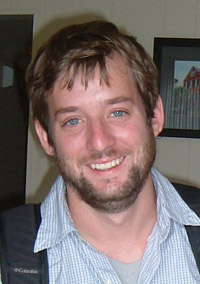
| Jacket 38 — Late 2009 | Jacket 38 Contents page | Jacket Homepage | Search Jacket |
This piece is about 2 printed pages long.
It is copyright © Brett Strickland and Jacket magazine 2009. See our [»»] Copyright notice.
The Internet address of this page is http://jacketmagazine.com/38/r-komunyakaa-rb-strickland.shtml
Yusef Komunyakaa
Warhorses
reviewed by
Brett Strickland
96 p. Farrar, Straus and Giroux, Hardcover 0374286434 US $24.00
1
Like Aphrodite rising from the foam of Uranus’s severed genitals, the poems in Yusef Komunyakaa’s most recent collection, Warhorses, begin in violence and birth a strange manner of love. Komunyakaa draws heavily from stories of ancient war for the first section, “Love in the time of War,” referencing the Gilgamesh Epic, Greek heroes Achilles and Odysseus, and biblical characters such as Cain and Abel.
Section 2
The first poem begins with the juxtaposition of two phrases, “The jawbone of an ass, a shank” (3) a line which recalls the biblical story of Samson, who used a donkey’s jaw to kill one-thousand Philistines. This line also illustrates one of the major themes of Warhorses—since the beginning of history, humans have twisted everything around them—animals, objects, even emotion—toward violence. A jawbone is not naturally a weapon. Perspective created a shank, just as it is human proclivity for violence that molded an animal—a horse—into an instrument of war.
3
Each poem in the first section is written as a sonnet, and although Komunyakaa breaks the stanzas differently in various poems, the first eight lines consider war, and the final six are devoted to the breed of love that exists in wartime. The separation between the two is clear in poems such as “They swarmed down over the town,” which begins:
4
They swarmed down over the town
& left bodies floating in the ditches
& moats. Bloated with silence,
blue with flies on the rooftops. (7)
5
The second half addresses the manifestation of love that arises afterward:
6
On the wild forgetful straw beds,
they created a new race, a new tongue
to sing occidental prayers & regrets.
7
Once readers understand the way Komunyakaa is organizing the stanzas, however, he begins erasing the boundaries between love and war. No longer at opposite poles, the two become, at times, inseparable. Warring surrounds love, and as a result, love retains qualities of violence, such as in the first section of “Hand-to-hand: the two hugged each other”
8
Hand-to-hand: the two hugged each other
Into a naked tussle, one riding the others back
locked in a double embrace. One
forced the other to kiss the ground. (9)
9
Although this stanza begins the poem, it just as easily could have ended it according to Komunyakaa’s method of organization. The two men are locked together “Hand-to-hand.” Whether in combat or in love is unclear, and because of the way that Komunyakaa chose to separate the stanza, they may well be the same thing.
10
“The Helmet” begins the second series, “Heavy Metal,” and is an imagining of how men first dreamed up rudimentary tools of war during a time “before/ bronze meant shield and breastplate… ”
11
Perhaps someone was watching
a mud turtle or an armadillo
skulk along an old interminable footpath
armored against sworn enemies. (19)
12
As the poems progress toward modern times, Komunyakaa devotes more lines to exploring humanity’s obsession with weaponry. In “The Catapult”, men struggle to turn back a winch and use a catapult for their own purposes. After loading the rocks, however, the warriors “bowed at the foot/ of the cross,”(20)—though they created the object they worshipped it, believing that the weapon they created had the power to save them. The theme of weaponry-as-god surfaces again in “Grenade”, which begins with the line, “There’s no rehearsal to turn flesh into dust so quickly,” (32) a reversal of the Genesis passage concerning the creation of man.
13
The final section of Warhorses, “Autobiography of my Alter Ego” is a long memoir poem which completes Komunyakaa’s history of violence with his return from the Vietnam War. “Forgive my heart & penis” he pleads, believing them both to be faculties of instinct, “but don’t forgive my hands.” (95) The human heart may be a mysterious force, but our hands are tools we are accountable for—a belief Komunyakaa spends all of Warhorses trying to explain and atone for.

Brett Strickland
Brett Strickland’s poetry has previously appeared in Cold Mountain Review. He lives in Oxford, Ohio with his wife, where he is a second year graduate student in Miami of Ohio’s creative writing program.